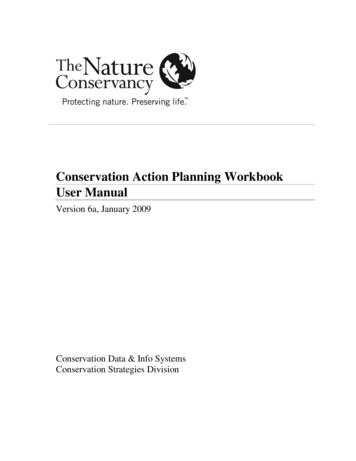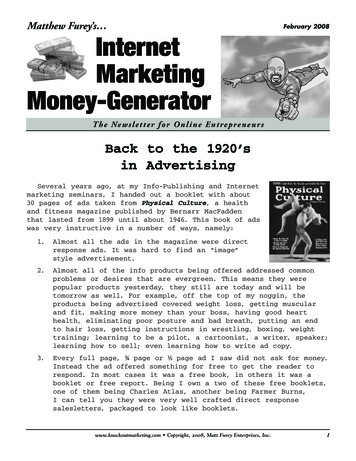
Transcription
NOTHING TO HIDEHope for Marriages Hurt by Pornography and Infidelityby Joann Condie, RN, MS, LPC
Discovering InfidelityIf your spouse has violated the wedding vows through habitualpornography use (Internet, videos, magazines), strip clubs, sexual chatrooms, phone sex, affairs or prostitutes, this booklet will provide specificsuggestions, guidelines and hope. For the sake of simplification, I willrefer mostly to addictive Internet pornography use, but please realize theprinciples apply to other sexual activities outside the marriage as well.Let’s begin by stating the obvious: Anything with this title is extremelydifficult to pick up and read if you have been hurt by a spouse’s sexualbetrayal. Your emotions can leave you feeling shipwrecked or lost atsea, with wave after wave of tears drowning your soul. Or, you maybe without tears, one minute strangely numb and the next filled withindescribable rage.Either way, it may seem as if you are going crazy. You’re not. You mayfeel completely abandoned. You’re not. You may feel as if God Himselfhas left and no one could possibly understand or help. Again, this is notthe case.Your profound sense of betrayal and excruciating pain is normal andnatural, considering a grenade has been thrown into the most preciousrelationship in your life. You will be able to regain your balance and startmoving forward; eventually you will be able to hold your head high andlook forward to another new day.You may wonder how anyone could offer hope at a time like this. Youmay also wonder why you should consider my suggestions. Let me revealsomething about myself. I am not a woman who has floated above theclouds, living a victorious Christian life. I am your fellow sister who hasalso been wounded. I have been wounded by my own sins and by thesins of others. Truly, all sin is damaging, regardless of the source.In fact, all of us might be considered “walking-wounded” in one aspector another. Some of us have scars that are visible and obvious, whileothers have wounds that have been kept hidden, wounds that have1
not yet begun to heal. However, we can do more than be healed; wecan become “wounded healers” for others. Many years ago, I offereda personal prayer: “God, don’t waste my pain.” In this, and in so manyother ways, He has proven faithful.Although I do not know the specific details of your story, I havecounseled many men and women over the years that have walked inyour shoes. Regardless of where you might be at this moment, if you arewilling, you can begin moving forward, step by step. We can take thiswalk together. I suggest we ask God to join us, because no one is morequalified or more capable to bring healing than the One who createdyou, your spouse and your marriage.2
Preparing for the JourneySurviving sexual infidelity can seem like trying to maneuver aconvoluted path up a steep mountain in the middle of the night. If thatisn’t treacherous enough, numerous land mines lie hidden just beneaththe topsoil. It is a frightening experience; it’s difficult to know whereto put down your next foot. However, using a trusted road map anda trusted guide reduces your chance of greater harm to yourself andyour family.Knowing how to manage your immediate crisis will be easier if youanalyze your life and recollect your past relationship responses. Forexample, when past relationships hit a difficult snag did you tend toretreat into self-blame or were you more likely to lash out and criticizeothers? Were you able to assertively address conflict or did you chooseto fight unfairly? Has it been easier for you to lie wounded and enda friendship than resolve the differences? Were you able to objectivelyassess what was occurring in your past relationships (or current marriage)or did you miss the red flags?Understanding your past behavior will provide keys to how you areresponding to your marital crisis today. Recalling your actions might berelatively easy for you or it may require considerable concentration, butthe task is worth the effort. Here are four examples of how some spousesrespond to infidelity:(1) Curious BystanderIf you are a Curious Bystander, you have had many anxious days andnights. You can’t understand why the knot in your stomach doesn’t goaway even after hearing your spouse’s words (which were meant toreassure you, but didn’t). For example, your husband may have chidedyou for mentioning the numerous porn sites (virtual prostitutes) youkeep finding on the computer. Perhaps when confronted, your wife(the mother of your two children) minimized evidence from a sexualchat room.3
Confronted with the incriminating data, your spouse might have givenmultiple explanations. These excuses may have seemed reasonable, butdid not convince your heart that all was well. Your gnawing questionsnever seemed to be fully answered by you or your spouse. Eventually,you wore down emotionally and entered a downward spiral ofself-doubt. Sadly, through this process, you began ignoring yourGod-given discernment.Curious Bystanders have great difficulty assertively confronting others.They generally waver, convinced that nice people don’t stir up trouble(they want peace at any price), and they fully believe “it will all go awayif it’s ignored.”(2) Previous VictimVictimization occurs in the form of abuse as well as neglect. Somepeople have been treated as objects to be used. This might have occurredin childhood with sexual molestation or in adulthood through sexualharassment or rape. Sexual abuse creates horrendous lifelong damage tovictims, especially if the survivors have not received adequate counselingto heal the wounds. From my experience with treating adult survivors, Ifind that young boys can be even more seriously injured psychologicallythan their female counterparts. And, unfortunately, men are less likelythan women to get the help they need.Others have been treated as objects to be ignored. Perhaps, because youwere female, your brothers received more attention or privilege, or yourmale co-workers automatically received promotions and bonuses youdidn’t. Consequently, you don’t trust men in general. Or you might be amale with a father who was never available to play catch, shoot hoops orwatch your little league game, and your mom was smothering and overinvolved in your life. You may not fully trust members of the opposite sex.Victims of abuse or neglect receive a “double whammy” when theirspouses cheat on them. If the original damage in their lives is not4
addressed, they will be ill-equipped for developing healthy relationships;after discovering their spouse’s infidelity, they are ill-equipped for dealingwith the fallout.(3) Love-Blind SurvivorDo affirmation, love and respect seem to escape you? Do you have a pasthistory of rocky relationships with unhappy endings, only to find yourselfnow in a rocky marriage tainted by infidelity? If this is the case, you maybe able to identify with the people who were treated as objects to beused or ignored.You may, however, be saying just the opposite, “I had a perfect childhoodwith a loving caring family.” You might admit, however, that your lifeseems performance-driven, with a high priority placed on a polishedimage. Your marriage may have been described as “perfect” and so youwere completely shocked at what you discovered. Yet sexual infidelityrevealed an intimacy disorder not much different from those with thevisibly troubled marriage. How can that be true?In both cases, the skills for developing an authentic, intimate relationshipwith your spouse were lacking. The desperate desire to fill the Godshaped void within you cannot be satisfied with people or performance.(This topic is addressed more fully in the next section titled, “Intimacyand Basic Trust.”)(4) Spiritual BarometerYou may be a person with a history full of faith, or of no faith at all.Either way, I would guess that you are experiencing some form ofspiritual distress right now. For example, if you have never consideredyourself a Christian, you may be recognizing for the first time howmuch you actually need God in your life. Or, as a Christian already, thedevastation of sexual infidelity may have caused you to reassess what youtruly believe about God. Since the betrayal came from the person youloved and trusted the most, your pain can lead you to wonder if God5
also betrayed you. You may have asked (audibly or within the secretrecesses of the heart): “What kind of God would allow such a terriblething to happen?”If you are wondering about your relationship with God or about God’srelationship with you, don’t feel alone; many others in your situationhave felt this way. I highly recommend reading Dr. James Dobson’s book,When God Doesn’t Make Sense. This comprehensive book addresses thetough questions asked for centuries, including some asked by King David,who wondered why the wicked could mock God and get away with it(Psalm 10). Let Dr. Dobson’s book point you back to an accurate view ofGod and provide encouragement and comfort to your soul.If you have gained some insight and understanding about your pastresponse patterns, then we are ready to go to the next stage of recovery.6
The Journey Toward HealingThe healing journey requires a personal commitment to work throughthe shock and pain of your spouse’s unfaithfulness. The basic tools forthis process are best remembered by using the acronym FAITH.FAITH Fear notAssess your support systemInsist your spouse decideTalk to a trained Christian counselorHeed biblical principlesF Fear NotFear is one of the first emotions experienced by those who have beenshocked by the evidence of their mate’s infidelity or pornography use.Other emotions, such as anger, pain and confusion, may appear on thesurface, but fear is often lurking beneath it all. Fear often causes either anunder or overreaction. These two extremes may seem like opposites, but,like a coin with two sides, under and overreacting are two sides of thesame dysfunction.Let’s look at two women I’ll call Angela and Stephanie:AngelaAngela’s marriage started out like a Cinderella story. Forgenerations, her side of the family had lived happily-ever-afterlives. Scott and his family were well respected for their businesssavvy and civic leadership. Angela was a stay-at-home mom,caring for three small sons, while Scott’s efforts nearly doubledthe sales for his family’s company.Sadly, the couple’s perfect image was simply a thin veneercovering the terrible truth behind closed doors. Scott,unfortunately, was not only a workaholic, but also a sex addict.Weekly business trips became the norm and X-rated hotelmovies became nightly fare. Eventually, Scott needed more and7
more to maintain his “high.” Strip bars and phone sex camenext, and, although he carried overwhelming torment, shameand guilt, he never could kick his addiction.Angela found evidence bit by bit throughout their marriageuntil eventually she could no longer avoid the truth. She beganto figure out the times Scott was unfaithful because when hereturned home he was more sullen and irritable than usual.Angela’s inner pain and loneliness ripped her heart to shreds.Scott’s unwillingness to connect emotionally drove her to severebouts of crying, but fear gripped her every time she thought ofleaving. She had walked away from a career years before andwondered how she could keep her sons financially secure. Shealso worried about what her family and friends would think.Scott tried to keep his ugly secret from her, and she kept theirugly secret from the outside world.StephanieStephanie was intently searching the Internet for stats to usein a presentation when she stumbled upon sites used by herhusband, Michael. She became nauseated by the sexual scenesshe saw and later discovered even more violent and repulsivematerial when she checked the history file. Her mind filledwith visions of her sister’s suicide attempt following her ownhusband’s adultery. Stephanie immediately called Michael’s officeand demanded he come home at once. She refused to answerhis anxious questions and slammed down the phone. Whenhe rushed into the house, worried and shaken, she screamedhateful, angry words about his pornography use and called himhorrible names. Stephanie demanded he move out of the houseor she would ruin his career. All attempts by Michael to confesshis addiction and consider a solution were met by Stephanie’sescalating anger.My suggestion to people in these types of situations is: “Resist thetemptation toward fear.”8
Underreacting, like Angela’s response, results from a frozen-in-fear state.This paralysis: 1) prevents the clear thinking required to make healthy,godly choices and 2) inhibits taking a proactive approach which mighteffectively start the healing process.Overreacting, like Stephanie’s response: 1) adds insult to the alreadyinjured relationship, resulting in more damage than what was initiallydealt by the adulterer himself, 2) is frequently an unintentional attemptto appear in control of an out-of-control situation, and 3) shows upwhen you assume the worst before hearing all the facts.The enemy of our souls uses the terrible, but effective, tactic calledFEAR, which is simply False Evidence Appearing Real. Don’t play intohis hand. Instead, remember Jesus’ promise: “Peace I leave with you; mypeace I give you. I do not give to you as the world gives. Do not let your hearts betroubled and do not be afraid” (John 14:27).Now would be the time to plant your feet firmly in the bedrock ofGod’s love and His provision for you and your family, even when itappears your world has been blown apart.A Assess Your Support SystemSadly, many people, like Angela, jump from an underreacting “Fear Base”position to that of a “Cover-up Agent,” hiding from others. However,if ever you needed the support of trusted friends, now is the time. Assomeone wisely said, “A Christian without a support system is like anaccident waiting to happen.”Women, by nature, tend to maintain a more active support system thanmen. But, even women seem to reject that same support when they needit the most. Why is this? First, if they are like Angela, they carry guilt andshame that rightly should be carried by the unfaithful spouse. This wrongreaction then leads them into a second unhealthy response: They buy intotheir unfaithful spouses’ system of hiding the sin. Third, fear convincesthem that others would abandon them if they knew the truth about their9
marriage. Therefore, they conclude they don’t need an authentic supportsystem, but rather fair-weather friends to maintain the good image.Remember, God wants us to hate sin as much as He does. How muchdoes our heavenly Father hate sin? So much that He would have Hisonly Son (without a trace of sin) carry our sin to the cross to suffer anddie for it. Let us never be so callous as to first, wink our eye at sin, orsecond, cover up another’s sin in an attempt to hide it from our family,other believers or God.The Bible offers clear instruction on this point: “Nothing in all creation ishidden from God’s sight. Everything is uncovered and laid bare before the eyes ofhim to whom we must give account” (Hebrews 4:13).Others are more like Stephanie, who jump from an overreacting “FearBase” position to that of a “Broadcasting Agent.” Let me be very clearon this point: When I recommend not hiding the sin but rather talkingabout it, I am not suggesting becoming another Stephanie, announcingyour spouse’s porn addiction at the next family reunion or from thepulpit on Sunday.What I am saying is you need trusted prayer partners of the same sexto help you through this difficult time. Pray and ask for God’s help indeciding whom you should trust with the information about your maritalcrisis. Ideally, you already have a trustworthy and biblically-balancedspiritual mentor. Call on two or three Christian friends to carry you, asyou pour out your grief and suffering. The Bible indicates that there iswisdom in a multitude of counselors (Proverbs 11:14). Allow them topray with you and provide the backbone needed for the times when youmay waver or take a shortcut.A word of cautionPlease, be extra cautious and do not lean on a friend or coworker ofthe opposite sex. You are more vulnerable than usual right now. Manya heartbreaking story has ended with men or women going to anotherfor comfort only to end up in their arms—and then in their bed—10
committing sins similar to their spouses’. Also be wary of people whoinsult your intelligence by oversimplifying your marital dilemma. As wassaid earlier, infidelity is a complicated and convoluted issue.You also may be hearing a variety of voices from well-meaning peoplewho are sincere, but sincerely wrong! Wounded spouses have given me along list of bizarre suggestions provided by friends, parents or pastors.A few of these include: “The sooner you forgive, forget and move forward, the quicker he will lose interestin his mistress.” “Pray more; your wife’s sex addiction is directly in proportion to your lack of faithin what God can do.” “Lose weight (or gain), change your hair color (or style) or wear sexier lingerie.” “He’ll stop picking up prostitutes if you make him jealous by flirting with hisbest friend.” “Expose her sex habits to your young children; that will shame her into stopping.”I have also heard a hundred different reasons why the infidel’s secret sinshould now also be the hurting spouse’s secret.Here are some of the more creative excuses: “Don’t tell anyone what she’s doing because you’ll ruin her career, or reputation inthe family or church.” “We can’t talk about it now. Our daughter is engaged; we are too busy planningfor the wedding.” “Grandma is getting up in years; we don’t want her to think badly of us.” “Burn his pornographic magazines and videos. That will be his wake up call andno one will ever need to know.”There will likely be a lot of confusing information in your head at thistime. Pray for God’s help in removing excuses, denial, rationalization,minimization and various codependency traits. Remember thatsupportive friends and family can keep you accountable at weak times11
when strong emotions or bad advice detour you from personal andrelationship goals. Balanced people without a hidden agenda can helpyou stay balanced.I Insist Your Spouse DecideYou must be clear with your unfaithful spouse. He or she must decideto have you alone as a marital partner. He cannot have you plus hisother mistresses, be they prostitutes, pornography, girlfriends, strip clubsor whatever else takes him away. She cannot expect you to continue asif nothing is wrong, while she has another man online or waiting in thewings. Do you remember your vows taken before God to “forsake allothers?” That applies today, tomorrow and always. Insist on it!Many marriages end in divorce or exist simply as a piece of paper at cityhall because the spouse of the sex addict was unsure of himself or herself.This is not the time for you to get weak-kneed or cater to any of yourcodependent weaknesses. If you have any hesitation about whether ornot this is a healthy biblical position, please read the best book I knowfor explaining these principles, Love Must Be Tough, by Dr. James Dobson.If you allow your spouse to continue with the affair or pornography use,the disrespect will continue. This leads to contempt, which offers theleast likelihood of saving the marriage.T Talk to a Trained Christian CounselorI have already mentioned the importance of a strong system of friendsand family. Remember, however, that right now you are making someof the most important decisions of your entire life. These folks may behelpful and supportive in some manner, but when it comes to decisionswith lifelong consequences, their suggestions may actually be harmful.Don’t make these common mistakes:Choosing a buddy instead of a trained counselorWe wouldn’t consider calling on our best friend to provide treatment for12
terminal cancer, no matter how nice he might be. In the same manner,when our marriage has symptoms of being terminal, we need to call ona professional Christian counselor with years of experience and expertise.Choosing a counselor simply because he or she treats a little of everythingSome professional counselors may have worked with a multitude ofcommon disorders, but have little or no expertise working in thisarea. Generic marriage counselors do well with generic problems;however, sex addiction, pornography addiction and adultery requirespecialized work.Choosing a counselor who simply focuses on fixing your spouse’sproblematic behaviorGod’s design for intimacy in marriage involves husband and wife deeplyconnecting in mind, spirit and body. The infidelity or sexually addictivebehavior reveals intimacy disorder in the spouse and in the marriage. Theinappropriate behavior must stop, of course, but the damage was alsodone to the wounded spouse. Therefore, the couple needs restoration andhealing. For more information, see “Intimacy and Basic Trust.”Choosing a counselor who automatically assumes many years of treatmentwill be neededBeware of therapists who move you toward dependence on them or onsomething other than dependence on God. Also, some sex addictioncounselors believe, “Once an addict, always an addict.” Concerningintimacy disorders, such as sex addiction, I personally do not believethis matches with what God says in the Bible. I believe (1) therapy mustcomprehensively address the intimacy disorder of the body, mind andspirit, or relapse is more likely to occur; and (2) recovery is certainly aprocess and not a magical event. But, God reminds us that we can be anew creation in Him (2 Corinthians 5:17) and He can restore the yearsthe locust took away (Joel 2:25).Choosing a counselor based on lowest feesDo not consider bargain shopping for the cheapest brain surgeon,parachute packer or licensed counselor! You and your marriage (andchildren) deserve the best care possible.13
Choosing a secular counselorFrequently, secular counselors are on insurance panels or have aconvenient office location. Does it matter if they are not Christian? Ifyou have a broken leg, a skilled secular physician can read the x-ray andplace a leg cast, but if you are broken in your marriage, in your spirit orin your heart, would you ever want to trust the treatment to someonewho had no understanding of God’s design for you and the spiritual basisfor marriage? No!If you need assistance in finding a licensed professional Christiancounselor in your region, Focus on the Family can help.They have alisting of therapists throughout the U.S. and Canada who have beenthoroughly screened. Call 1-855-771-HELP (4537) Monday throughFriday between 6:00 a.m. and 8:00 p.m. Mountain Time.Whenyou call that number, you may also ask for a one-time complimentaryconsultation with a Focus on the Family licensed Christian therapist. Ifone is not immediately available, you can leave your contact informationand a counselor will call you back as soon as possible.H Heed Biblical PrinciplesThis last letter of the acronym, FAITH, represents the most importantaspect of your journey. Regardless of what you have taken from thisbooklet up to this point, all advice must stand up to the test of heedingbiblical principles or else you “jump from the frying pan into the fire.”God is in the business of healing, and therefore, His plan and guidelineswill be the most accurate and effective. Following biblical principles is nota matter of “keeping the letter of the law,” for that approach was attempted(and failed) long before Jesus arrived.You can only maintain a functioning,balanced life when you have asked Jesus Christ to be your Savior, forgiverof your sins, and Lord of your life (letting Him guide and direct yourdecisions). If you have already taken that life-changing step, stay close toHim who will never leave you or forsake you. If you have not yet madethat decision, there could never be a better time than right now. Please calla local pastor or Focus on the Family’s counseling department to provideyou with additional guidance, support and resources.14
Continuing Your Journey in FAITHFaith in God will carry you through these most difficult times ofrecovering from infidelity. Don’t try to figure it all out today. Eventhough you may have just recently discovered the painful reality thatyour marriage is in trouble, the truth is, it has taken many months andyears to get to this point. As a result, it will take time to bring aboutrestoration for yourself and your marriage. Regardless of what yourspouse chooses to do next, you can choose to live fully and receivepeace and joy along the way.God is faithful and will never stop loving you or let you down.Your pain has a time limit built into it. How do I know? BecauseGod has proven His promise to me and many others just like you.God promises: “Weeping may tarry for the night, but joy comes with themorning” (Psalm 30:5, RSV).As you continue to press forward using the principles of FAITH, it isimportant to look below the surface of marital infidelity and considerthe key factors of intimacy and trust.15
Intimacy and Basic TrustYou entrusted your heart and soul to your husband and yet he violatedyour trust and your marriage vows. As a result of this infidelity you mayhave vowed to “never trust again.” Or, perhaps, you want to begin anewand you’re wondering, “How do I start trusting again?”These important issues will be addressed by previewing: (1) a healthymodel of intimacy and basic trust, (2) examining intimacy disorder anddistrust and (3) learning how to restore intimacy and trust.From cradle to grave, trust is the foundation of all healthy relationships,such as those between baby and mother, husband and wife, businessmanagers and employees or terminally ill patients and their caregivers.This vital element of trust occurs in two forms: primary and secondary.Webster’s Dictionary defines trust as: “confidence in the integrity, ability,character and truth of a person or thing.” The Bible, on the other hand,defines trust as the core confidence that a person is secure. Isaiah 12:2states: “Surely God is my salvation; I will trust and not be afraid. The Lord, theLord, is my strength and my song; he has become my salvation.”These two descriptions of trust are not at odds with each other. Webster’sgives an accurate depiction of secondary trust, while Isaiah describes anabiding primary trust.God’s original design for us is to have intimacy with Him (primary trust)and intimacy with others (secondary trust). When both forms of trust aresolidly rooted in our lives, we can maintain stability and sanity even intimes of personal crisis and chaos.Let’s look more closely at each type of trust, starting with the one withwhich we are most familiar.Secondary trustIn day-to-day relationships, secondary trust is established by the otherperson, based on what he or she does or doesn’t do. You might liken16
secondary trust to the stock market. When the other person performswell, trust goes up; when she performs poorly, trust goes down.For example, I might agree to loan my friend my laptop computerbecause previous experiences revealed he was responsible and dependable.In addition, when he has borrowed less expensive tools of mine, he hasreturned them on time and in their original condition. As long as hemaintains his good track record, I trust him.Our trust gets tested, however, in proportion to the value we place onthe item someone is borrowing. When a relationship is new, we mightrisk loaning something that is easily repaired or replaced. But, what ifthe item is a family heirloom? Now we begin to weigh the value of theitem against the value of the relationship. As the risk increases, moretrust is required.What happens if the stakes are even higher, such as extending our loveor sharing our heart with someone else? Such a request might seem toorisky or almost unthinkable if we previously suffered a broken heart oronly learned distrust while growing up.Such was the life of Bethany, who grew up in a family that appeared tobe “the Christian ideal.” Her biological family was intact and her parentsvolunteered weekly at their church. She and her two older brothersreceived good grades and never caused trouble. No one struggled withany serious problems, so all appeared well—at least on the outside.Bethany learned at an early age, however, to not talk about conflicts thatmight be churning inside herself or inside her home. Emotional needswere considered unimportant and generally ignored. Her dad seemed tohave plenty of time to give to church members and her brothers. Seldom,however, did he show interest in Bethany or extend love and affirmationto her. Once, she confided her feelings of rejection to her mother andthen got shamed for not being appreciative.Bethany drove home crying one day when her boyfriend asked her17
friend to the homecoming dance. She didn’t expect any support from herfamily, but she was unprepared for the jokes directed at her during dinner.Bethany’s heart was broken first by her boyfriend and then by her family.That evening, Bethany made a silent vow to never get hurt again.Bethany’s needs were not met, and her feelings of rejection, shame andfrustration were ignored. These types of encounters during the formativeyears actually set in place a type of “trust template” which will inadvertentlycontinue to operate throughout life. People like Bethany are ill-equippedfor establishing healthy, trusting relationships. Unless their wounds areacknowledged and healed, they will tend to be more vulnerable toaddictions or becoming the partner of someone with an addiction.Primary trustWhile most people are familiar with secondary trust, primary trust isactually more critical to the healthy development of the inner person(intrapersonal) and later to the healthy development of intimaterelationships with others (interpersonal).Trust in uteroMost specialists agree
never seemed to be fully answered by you or your spouse. Eventually, you wore down emotionally and entered a downward spiral of self-doubt. Sadly, through this process, you began ignoring your God-given discernment. Curious Bystanders have great difficulty assertively confronting others.










